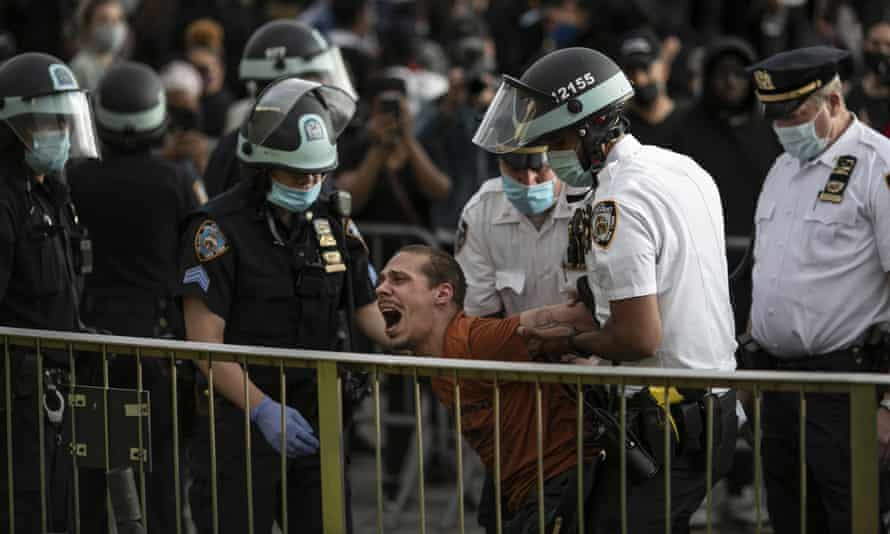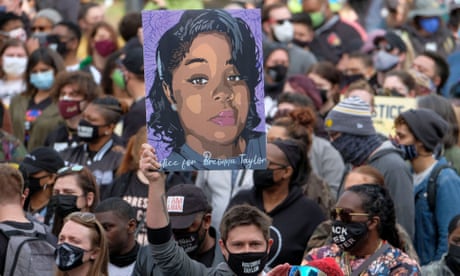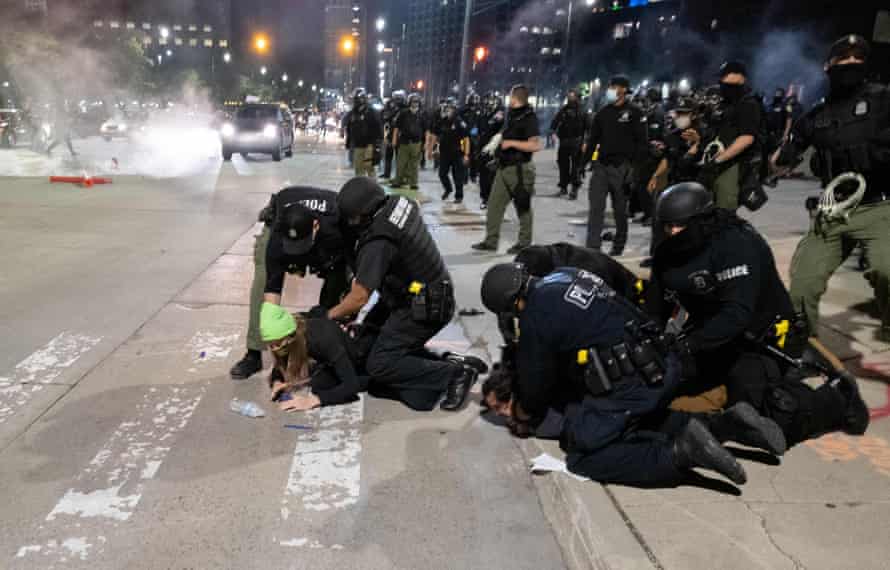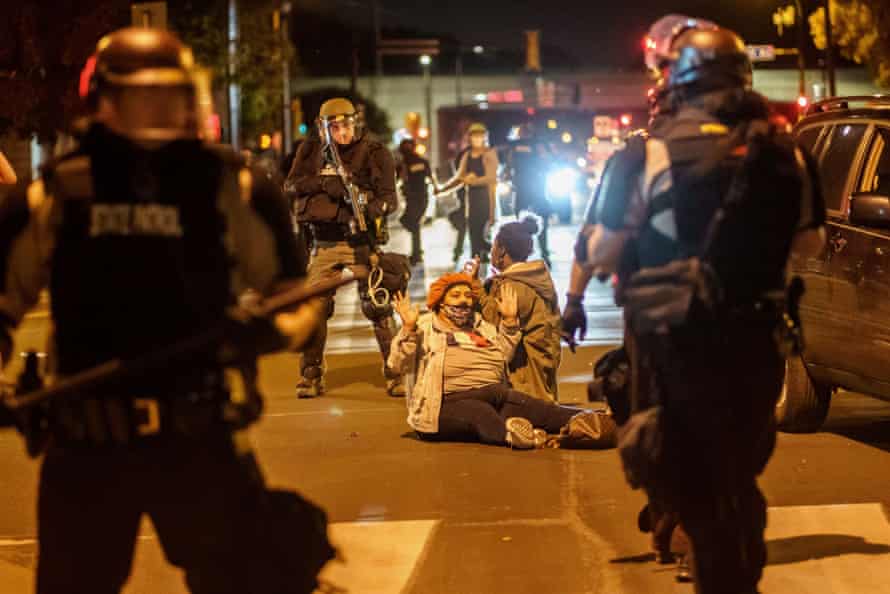Some prosecutors and law enforcement observers say departments carried out mass arrests as crowd control tactic

Police officers make an arrest during a rally calling for justice over the death of George Floyd, in Brooklyn, New York, on 1 June 2020. Brooklyn’s prosecutor dropped 83% of 136 more serious criminal cases, and Manhattan’s prosecutor dropped about 64% of nearly 1,000 cases. Photograph: Wong Maye-E/AP
Rights and freedom is supported by
 About this content
About this content
Tom Perkins
Sat 17 Apr 2021
Rights and freedom is supported by
 About this content
About this contentTom Perkins
Sat 17 Apr 2021
The vast majority of citations and charges against George Floyd protesters were ultimately dropped, dismissed or otherwise not filed, according to a Guardian analysis of law enforcement records and media reports in a dozen jurisdictions around the nation.

After Breonna Taylor's death, activists fought to ban surprise police raids. One year later, they're winning
But some prosecutors and law enforcement observers charge that departments carried out mass arrests as a crowd control tactic, as a means to silence peaceful protesters, and as a public relations strategy designed to turn the public against demonstrators by making them appear more violent than they were. And what’s more – some of the citing officers never witnessed the protests in the first place.
“It sends a message that you might get arrested if you express your views and first amendment rights,” said Vera Eidelman, staff attorney with the ACLU’s speech, privacy and technology project. “Police absolutely should not be relying on mass arrests to control a crowd or silence people who they disagree with.”
In most of a dozen jurisdictions examined, at least 90% of cases were dropped or dismissed. In some cities, like Dallas and Philadelphia, as many as 95% of citations were dropped or not prosecuted.
Q&A
What is the Overpoliced, underprotected series?
In Houston, about 93% of citations were dropped; in Los Angeles, about 93% of citations were not filed. The prosecutor’s office in San Francisco dismissed all 127 cases related to “peaceful protest-related charges”, though data for more serious citations was not available.
Officials did not file charges for nearly all low-level offenses, like disobeying curfews, while they most often pursued cases with strong evidence of more serious crimes, like assault or looting. Still, data shows that a majority of felony charges were also dropped, which some prosecutors said was due to a lack of evidence.
The analysis does not include federal charges, and the figures are estimates that will change as the remaining cases play out in court. Police sent citations to a patchwork of agencies and departments in different cities where prosecutors, mayors or city attorneys largely made the call to drop charges.
Mayors in every city except Detroit dropped all citations over which they had jurisdiction. The administration of Mayor Mike Duggan, a former prosecutor, pursued a high number of low-level misdemeanor charges or ordinance violations, even though the demonstrations were largely peaceful. But district court judge Larry Williams Jr dismissed more than 100 cases because police refused to provide basic evidence, such as body-cam footage.
In most instances, Detroit officers who wrote tickets were not at the protests and didn’t actually witness the alleged crimes, said the National Lawyers Guild and Detroit Justice Center attorney Rubina Mustafa. Instead of continuing to attempt to prosecute with shoddy evidence, the city earlier this year dropped nearly 300 more citations, but has still pursued dozens of charges against protest organizers. All told, 93% of Detroit cases have been dropped.
Among those still facing charges is the Detroit Will Breathe organizer Tristan Taylor, who said the mass arrests across the country are “all about intimidation” of people who vocally oppose police brutality: “It says something about the nature of policing when that’s a uniform tactic.”
NOT JAN 6


Officers arrest a protester near the police station in Detroit, Michigan,
on 30 May 2020. Photograph: Seth Herald/AFP/Getty Images
The mass arrests were also part of a public relations campaign by Duggan and the Detroit police chief, James Craig, to paint the protesters as violent agitators and undermine their messaging, a strategy used by police in cities across the nation, said Tyler Crawford, the National Lawyers Guild director of mass defense.
“What they try to do is spin it and say ‘Look at how unlawful protesters are as is evidenced by all of these arrests that we’ve made,’” he said. “Then they hope people have stopped paying attention after six, 10, 12 months when prosecutors say, ‘Hey, we’ve got to drop these charges because these people shouldn’t have been arrested.’”
In Dallas, where more than 95% of cases were not filed, police represent an exception. The department dropped about 675 charges stemming from one protest because “the spirit of service to which the Dallas police department is committed would not be exemplified by moving forward with charges,” leadership explained in an August report. Still, it sent nearly 200 charges to the prosecutor’s office, of which about 85% were dropped or had not been filed as of September, though a department spokesperson did not know the outcome of eight cases.
In Philadelphia, police sent over 1,700 charges to the city and the office of the district attorney, Larry Krasner. Mayor Jim Kenney and Krasner dropped or are poised to drop about 95% of the charges, including all ordinance violations. Krasner is handling a large portion of the more serious misdemeanors and felonies with a restorative justice program that involves dropping charges upon completion of the program. It includes a mix of meeting with victims, community service and referrals to job and education programs. Only about 80 of the most serious charges have so far been filed.
“Police were making arrests as a form of crowd control, so in many instances there were no criminal charges to file,” a Krasner spokesperson, Jane Roh, said. “In other instances, there was simply not enough information to proceed on opening a criminal case.”
The number of dropped cases are also relatively high in cities that witnessed more violence. In Minneapolis, where Floyd was killed, more than 90% of cases were dropped by November, though a local Black Lives Matter leader told the Guardian that hundreds of charges that police made since then remain in legal limbo. Portland has also seen recent violent clashes between protesters and law enforcement. Still, only 15% of nearly 1,100 cases have been filed and 82% have been rejected by the Multnomah county prosecutor, Mike Schmidt.
The mass arrests were also part of a public relations campaign by Duggan and the Detroit police chief, James Craig, to paint the protesters as violent agitators and undermine their messaging, a strategy used by police in cities across the nation, said Tyler Crawford, the National Lawyers Guild director of mass defense.
“What they try to do is spin it and say ‘Look at how unlawful protesters are as is evidenced by all of these arrests that we’ve made,’” he said. “Then they hope people have stopped paying attention after six, 10, 12 months when prosecutors say, ‘Hey, we’ve got to drop these charges because these people shouldn’t have been arrested.’”
In Dallas, where more than 95% of cases were not filed, police represent an exception. The department dropped about 675 charges stemming from one protest because “the spirit of service to which the Dallas police department is committed would not be exemplified by moving forward with charges,” leadership explained in an August report. Still, it sent nearly 200 charges to the prosecutor’s office, of which about 85% were dropped or had not been filed as of September, though a department spokesperson did not know the outcome of eight cases.
In Philadelphia, police sent over 1,700 charges to the city and the office of the district attorney, Larry Krasner. Mayor Jim Kenney and Krasner dropped or are poised to drop about 95% of the charges, including all ordinance violations. Krasner is handling a large portion of the more serious misdemeanors and felonies with a restorative justice program that involves dropping charges upon completion of the program. It includes a mix of meeting with victims, community service and referrals to job and education programs. Only about 80 of the most serious charges have so far been filed.
“Police were making arrests as a form of crowd control, so in many instances there were no criminal charges to file,” a Krasner spokesperson, Jane Roh, said. “In other instances, there was simply not enough information to proceed on opening a criminal case.”
The number of dropped cases are also relatively high in cities that witnessed more violence. In Minneapolis, where Floyd was killed, more than 90% of cases were dropped by November, though a local Black Lives Matter leader told the Guardian that hundreds of charges that police made since then remain in legal limbo. Portland has also seen recent violent clashes between protesters and law enforcement. Still, only 15% of nearly 1,100 cases have been filed and 82% have been rejected by the Multnomah county prosecutor, Mike Schmidt.

Minneapolis state patrol arrest protesters on 7 October 2020.
Photograph: Kerem Yucel/AFP/Getty
In New York City, more than 5,000 summonses that police wrote citywide for low-level offenses were dismissed by a summons court, according to the court’s chief clerk. Though the precise percentage is unclear, the National Lawyers Guild attorney Gideon Oliver, who coordinated defense for many of those cited, said the “vast majority”, if not all, of summonses were or will be dismissed. Meanwhile, Brooklyn’s prosecutor dropped 83% of 136 more serious criminal cases, and Manhattan’s prosecutor dropped about 64% of nearly 1,000 cases.
The mass arrests overwhelmed already strained criminal justice systems by forcing them to contend with processing thousands of protesters. That resulted in delayed arraignments and kept high numbers of inmates crowded in small New York jails for up to days at a time during the pandemic, Crawford said.
“The police response created this whole additional public health crisis that wasn’t something people talked about much, but, in the moment, that was one of the biggest issues we were concerned about,” he said.
Moreover, forcing the criminal justice system to process thousands of cases based on flimsy evidence that probably would not result in prosecutions represented an enormous waste of tax dollars and time, observers said.
“That’s not what the government should be doing,” Eidelman said. “It points to an excessive use of governmental authority.”
In New York City, more than 5,000 summonses that police wrote citywide for low-level offenses were dismissed by a summons court, according to the court’s chief clerk. Though the precise percentage is unclear, the National Lawyers Guild attorney Gideon Oliver, who coordinated defense for many of those cited, said the “vast majority”, if not all, of summonses were or will be dismissed. Meanwhile, Brooklyn’s prosecutor dropped 83% of 136 more serious criminal cases, and Manhattan’s prosecutor dropped about 64% of nearly 1,000 cases.
The mass arrests overwhelmed already strained criminal justice systems by forcing them to contend with processing thousands of protesters. That resulted in delayed arraignments and kept high numbers of inmates crowded in small New York jails for up to days at a time during the pandemic, Crawford said.
“The police response created this whole additional public health crisis that wasn’t something people talked about much, but, in the moment, that was one of the biggest issues we were concerned about,” he said.
Moreover, forcing the criminal justice system to process thousands of cases based on flimsy evidence that probably would not result in prosecutions represented an enormous waste of tax dollars and time, observers said.
“That’s not what the government should be doing,” Eidelman said. “It points to an excessive use of governmental authority.”
No comments:
Post a Comment